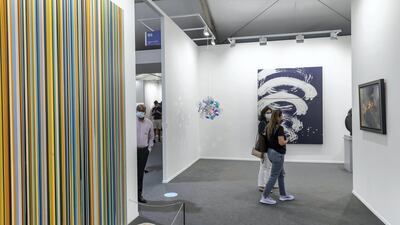Dubai’s business-friendly environment and diverse ecosystem will help to propel the growth of its creative sector within five years, experts said.
The government’s plan to almost double the contribution of the creative and arts sector to 5 per cent of gross domestic product in 2025 is significant and realistic, given its economic fundamentals, said Scott Livermore, chief economist at Oxford Economics Middle East.
The sector currently accounts for 2.6 per cent of GDP.
“Recent policy moves and traditional strengths means the Dubai economy is well placed to capitalise on opportunities offered by creative industries,” he said. “The targeted [GDP] sector contribution seems achievable.”
The creative industries include a broad umbrella of sectors, some of which complement Dubai’s traditional strengths in areas such as tourism and its ongoing drive to develop its digital economy.
Recent reforms to residence visas and measures to improve liveability in Dubai will also be a draw for professionals from a range of disciplines including, digital, information technology, design and advertising, said Mr Livermore.
Sheikh Mohammed bin Rashid, Vice President and Ruler of Dubai, on Saturday set out a plan to boost the value of the city’s creative sector by generating more jobs and increasing the number of companies in the industry.
About 8,300 businesses currently operate in the sector, which Dubai intends to increase to 15,000 by 2025.
These companies employ about 70,000 people and the emirate plans to double this in the next five years.
Design, content, culture and arts will be a “major driver for the future of our country”, said Sheikh Mohammed.
“The UAE is a global economic capital and creativity is part of our economy and of our quality of life, and a major engine for the future of our country.”
The emirate, which does not have significant hydrocarbon resources, has been developing its non-oil economy for decades. Trade, tourism and property have been traditional sources of strength, but arts and the creative industries have been growing in prominence.
The emirate is home to specialist creative free zones such as Dubai Internet City, Dubai Media City, Studio City, Production City and the Dubai Design District.
These creative clusters host budding start-ups as well as global advertising, design, media, film production, arts, entertainment, digital and technology companies.
“One thing that Dubai does very well is that it makes sure that the infrastructure keeps ahead of demand,” said Monica Malik, chief economist at Abu Dhabi Commercial Bank.
“There is ample infrastructure and technology in place and all that works in Dubai’s favour.”
Dubai’s move to grow its creative industry reflects the emirate’s response to how the global economy is changing, with new sectors emerging, spending habits evolving and work locations becoming more flexible.
For the creative industry, “it is a complete package”, she said.
“There is a lot of critical mass in Dubai, it is very multicultural and its ease of doing business all go hand in hand. Dubai is creating a business environment that has energy and that is easy to work in.”
A stronger creative sector could be “transformative in terms of income generation, job creation and tourism to the local economy”, said Mo Fadlallah, creative director at the Integrity Media Group and chief executive of Baby Arabia, a digital child development and education platform.
The creative economy contributes to the well-being of communities as it “acts as an enabler and stimulator through innovation and creativity, which can deliver sustainable growth for the broader economy”, he said.
Dubai’s move is line with other developed economies that have witnessed significant growth in the contribution of creative industries.
Britain's "flat white economy" is now 28 per cent bigger than the country's manufacturing sector, the Centre for Economics and Business Research said in a report last month.
The creative industry has taken a hit amid the Covid-19 pandemic and was among the most affected sectors after sectors such as aviation and tourism.
To flourish in a post-pandemic world, greater incentives and subsidies are required, said Mr Fadlallah.
The creative sector witnessed some belt-tightening last year as clients demanded “more bang for their buck”, said Alex Koumi, a managing director at recruiter Kingston Stanley.
His company, which hires staff for creative agencies, said the use of freelancers has increased since the unveiling of cheaper freelance visas.
A series of flexible work regulations catering to freelance and "gig economy" workers were introduced recently, which could help to broaden the talent pool.
These include permits allowing people to work remotely from the UAE for employers based outside the country.
"You can be a graphic designer, an art director, a digital designer under a freelancer visa. Two or three years ago you needed to be employed by a company," he said.
The growth of the UAE's e-commerce sector is also creating opportunities, he said, particularly for experts in user experience and user integration roles that improve the design of websites.
“As companies diversify their ways to sell, they need to create a brand online – how is the app going to look? How is the website going to look?" he said.











